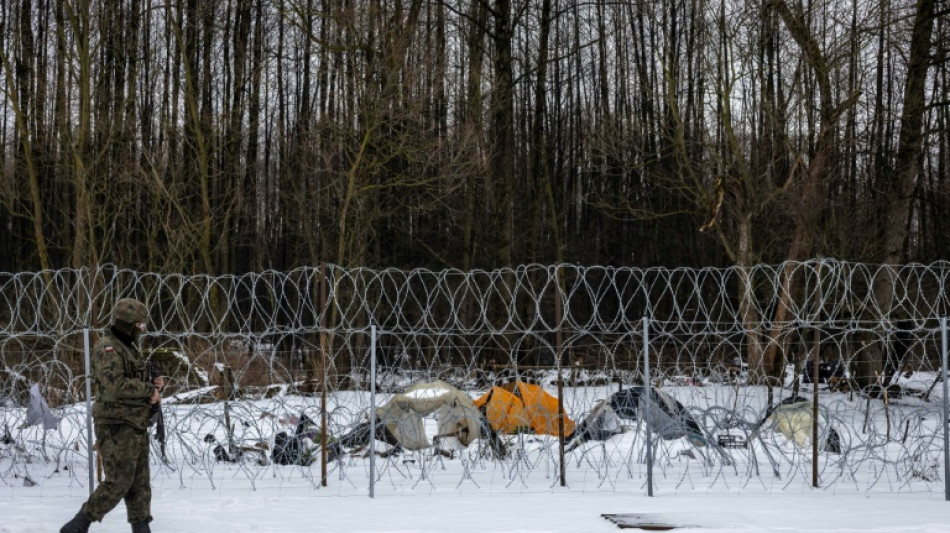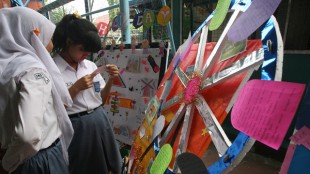
-
 Economic losses from natural disasters down by a third in 2025: Swiss Re
Economic losses from natural disasters down by a third in 2025: Swiss Re
-
Indonesians reeling from flood devastation plea for global help

-
 Timeline: How the Bondi Beach mass shooting unfolded
Timeline: How the Bondi Beach mass shooting unfolded
-
On the campaign trail in a tug-of-war Myanmar town

-
 Bondi Beach suspect visited Philippines on Indian passport
Bondi Beach suspect visited Philippines on Indian passport
-
Kenyan girls still afflicted by genital mutilation years after ban

-
 Djokovic to warm up for Australian Open in Adelaide
Djokovic to warm up for Australian Open in Adelaide
-
Man bailed for fire protest on track at Hong Kong's richest horse race

-
 Men's ATP tennis to apply extreme heat rule from 2026
Men's ATP tennis to apply extreme heat rule from 2026
-
Cunningham leads Pistons past Celtics, Nuggets outlast Rockets

-
 10-year-old girl, Holocaust survivors among Bondi Beach dead
10-year-old girl, Holocaust survivors among Bondi Beach dead
-
Steelers edge towards NFL playoffs as Dolphins eliminated

-
 Australian PM says 'Islamic State ideology' drove Bondi Beach gunmen
Australian PM says 'Islamic State ideology' drove Bondi Beach gunmen
-
Canada plow-maker can't clear path through Trump tariffs

-
 Bank of Japan expected to hike rates to 30-year high
Bank of Japan expected to hike rates to 30-year high
-
Cunningham leads Pistons past Celtics

-
 Stokes tells England to 'show a bit of dog' in must-win Adelaide Test
Stokes tells England to 'show a bit of dog' in must-win Adelaide Test
-
EU to unveil plan to tackle housing crisis

-
 EU set to scrap 2035 combustion-engine ban in car industry boost
EU set to scrap 2035 combustion-engine ban in car industry boost
-
Australian PM visits Bondi Beach hero in hospital

-
 'Easiest scam in the world': Musicians sound alarm over AI impersonators
'Easiest scam in the world': Musicians sound alarm over AI impersonators
-
'Waiting to die': the dirty business of recycling in Vietnam

-
 Asian markets retreat ahead of US jobs as tech worries weigh
Asian markets retreat ahead of US jobs as tech worries weigh
-
Security beefed up for Ashes Adelaide Test after Bondi shooting

-
 Famed Jerusalem stone still sells despite West Bank economic woes
Famed Jerusalem stone still sells despite West Bank economic woes
-
Trump sues BBC for $10 billion over documentary speech edit

-
 Chile follows Latin American neighbors in lurching right
Chile follows Latin American neighbors in lurching right
-
Will OpenAI be the next tech giant or next Netscape?

-
 Khawaja left out as Australia's Cummins, Lyon back for 3rd Ashes Test
Khawaja left out as Australia's Cummins, Lyon back for 3rd Ashes Test
-
Australia PM says 'Islamic State ideology' drove Bondi Beach shooters

-
 Scheffler wins fourth straight PGA Tour Player of the Year
Scheffler wins fourth straight PGA Tour Player of the Year
-
Nano One Receives C$10.9M from Financing and Government Programs

-
 WelcomeVille Investment Association With Leadership From Reginald Pembroke Rolls Out a Digital Collaboration Platform
WelcomeVille Investment Association With Leadership From Reginald Pembroke Rolls Out a Digital Collaboration Platform
-
Grande Portage Reports Advancements of Transportation Infrastructure at the New Amalga Gold Project

-
 Genflow Completes Dosing Phase of Canine Gene Therapy Trial
Genflow Completes Dosing Phase of Canine Gene Therapy Trial
-
President Trump Cleaning Up Biden's Marijuana Mess - MMJ Preparing to Move FDA Huntington's Cannabis Trials Forward

-
 Security beefed up for Ashes Test after Bondi shooting
Security beefed up for Ashes Test after Bondi shooting
-
Wembanyama blocking Knicks path in NBA Cup final

-
 Amorim seeks clinical Man Utd after 'crazy' Bournemouth clash
Amorim seeks clinical Man Utd after 'crazy' Bournemouth clash
-
Man Utd blow lead three times in 4-4 Bournemouth thriller

-
 Stokes calls on England to 'show a bit of dog' in must-win Adelaide Test
Stokes calls on England to 'show a bit of dog' in must-win Adelaide Test
-
Trump 'considering' push to reclassify marijuana as less dangerous

-
 Chiefs coach Reid backing Mahomes recovery after knee injury
Chiefs coach Reid backing Mahomes recovery after knee injury
-
Trump says Ukraine deal close, Europe proposes peace force

-
 French minister urges angry farmers to trust cow culls, vaccines
French minister urges angry farmers to trust cow culls, vaccines
-
Angelina Jolie reveals mastectomy scars in Time France magazine

-
 Paris Olympics, Paralympics 'net cost' drops to 2.8bn euros: think tank
Paris Olympics, Paralympics 'net cost' drops to 2.8bn euros: think tank
-
Chile president-elect dials down right-wing rhetoric, vows unity

-
 Five Rob Reiner films that rocked, romanced and riveted
Five Rob Reiner films that rocked, romanced and riveted
-
Rob Reiner: Hollywood giant and political activist


Media under watch on EU's frozen eastern frontier
Squeezed into the back of a military jeep driving along frozen unpaved roads on the Poland-Belarus border, a group of journalists is being taken into a restricted zone under strict surveillance.
Soldiers with assault rifles slung over their shoulders can be seen spaced out along the EU's eastern border, patrolling lines of razor wire that stretch out as far as the eye can see.
A makeshift shelter partially covered in tarpaulin and wooden planks of wood offers some respite for the soldiers, who were deployed to the area following a sharp rise in migrant arrivals.
Nearby, a car mounted with speakers blares out a message in several languages urging migrants to stay on or return to the Belarusian side.
"Migrants are still trying to cross the border in groups of 10 or 20. Last year, it was groups of hundreds of people," said Krystyna Jakimik-Jarosz, a spokeswoman for the border guards.
The West accused the Belarusian regime of orchestrating a migrant crisis last year as a form of retaliation against EU sanctions.
Belarus has denied this and urged the EU to take the migrants in, although it has since repatriated several thousand back to the Middle East.
Confronted with a sharp increase in arrivals, Poland in September banned media and aid groups from the immediate border area citing security reasons, and put up razor wire and deployed soldiers.
Aid groups have since accused both Poland and Belarus of violating migrants' rights and media rights groups have criticised the restrictions.
The Polish Supreme Court has also declared the ban on the media "incompatible" with the law.
- 'Protect' from journalists -
Facing criticism, Poland's populist government in December began organising trips for journalists to the restricted area but only under strict controls.
"We want to show what the situation on the border looks like," Jakimik-Jarosz said, who shadowed the media group along with two border guards who hid their faces so as not to reveal their identity.
Around 100 journalists have so far been allowed in.
"At the beginning it was above all Polish media who could visit the zone. Foreign journalists had to be specially verified," the spokeswoman said.
Coverage of the start of construction this week of a border wall being built by Poland along 186 kilometres (115 miles) of frontier was also heavily restricted.
"This is about your security and ours. If something were to happen, we would be responsible," Jakimik-Jarosz said.
"But it is also to protect ourselves to ensure that we can do our job of protecting the border."
She said soldiers and border guards last year found themselves "having to protect themselves sometimes from journalists who pointed cameras in their faces and asked them to identify themselves".
Of the media ban, she added: "I understand that this is not always satisfactory for everyone".
L.Harper--AMWN